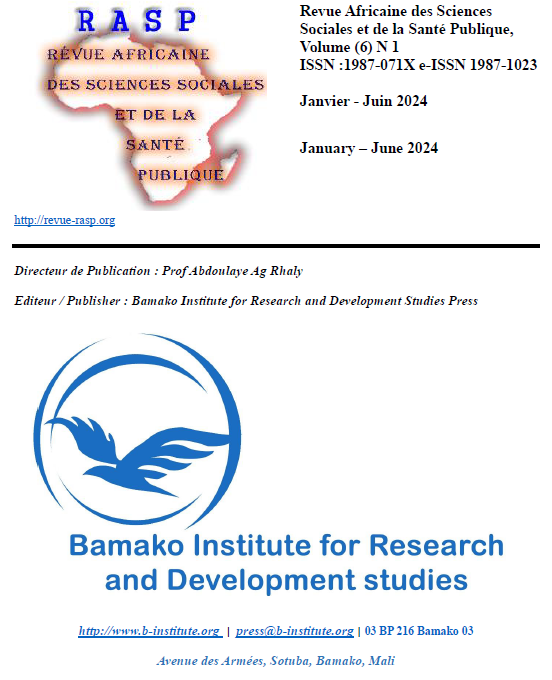Etude du paiement électronique des agents de santé : cas de la campagne de vaccination contre la rougeole et la rubéole en Côte d’Ivoire
Mots-clés:
Utilisation du téléphone portable, Personnel de santé, Revenu, Campagne de vaccination, Côte d’IvoireRésumé
La motivation des agents de santé à travers le paiement à temps et complet constitue l’un des éléments clés pour atteindre de bonne couverture vaccinale. Notre objectif était de décrire le paiement électronique utilisé lors de la campagne rubéole-rougeole et d’apprécier la satisfaction du personnel de santé. Nous avons réalisé une étude transversale à visée analytique qui s’est déroulée en Côte d’Ivoire du 15 janvier au 18 février 2019. La population d’étude était constituée des acteurs impliqués à la fois dans la campagne de vaccination contre la rougeole-rubéole en 2018 et dans le paiement électronique. Une recherche documentaire et des entretiens structurés ont permis le recueil des données. Les données ont été analysées à partir du logiciel R studio version 2021. Le système assurant le paiement électronique se composait des autorités sanitaires, d’un opérateur privé de téléphonie mobile, d’un partenaire technique et financier et des agents de santé bénéficiaires. Un système de critères d’identification, des listes de validation et de vérification à plusieurs niveaux de la pyramide sanitaire a été mis en place. Moins de trois quarts des acteurs du niveau primaire ont été satisfaits par ce mode de paiement. Le paiement électronique constitue un procédé pour améliorer le paiement des agents de santé durant les campagnes de vaccination. Des leçons d’un tel système de paiement devraient être tirées pour un déploiement à grande échelle.
Références
Bangura, J. A. (2016). Saving money, saving lives: A case study on the benefits of digitizing payments to ebola response workers in sierra leone. Better Than Cash Alliance, New York.
Bester, J. C. (2016). Measles and measles vaccination: A review. JAMA Pediatrics, 170(12), 1209–1215.
Gaudelus, J. (2010). Rougeole: Son élimination passe par une amélioration de la couverture vaccinale. Antibiotiques, 12(1), 67–74.
Mangone, E. R., Lebrun, V., & Muessig, K. E. (2016). Mobile Phone Apps for the Prevention of Unintended Pregnancy: A Systematic Review and Content Analysis. JMIR MHealth and UHealth, 4(1), e6. https://doi.org/10.2196/mhealth.4846
Mavridis, D., & De Walque, D. (2022). Cash Transfers after Ebola in Guinea: Lessons Learned on Human Capital. The World Bank. https://doi.org/10.1596/1813-9450-9989
McConnell, M., Mahajan, M., Bauhoff, S., Croke, K., Verguet, S., Castro, M. C., Furtado, K. M., Mehndiratta, A., Farzana, M., Rashid, S. F., & Cash, R. (2022). How are health workers paid and does it matter? Conceptualising the potential implications of digitising health worker payments. BMJ Global Health, 7(1), e007344. https://doi.org/10.1136/bmjgh-2021-007344
Nimpagaritse, M., Korachais, C., & Meessen, B. (2020). Effects in spite of tough constraints—A theory of change based investigation of contextual and implementation factors affecting the results of a performance based financing scheme extended to malnutrition in Burundi. PloS One, 15(1), e0226376. https://doi.org/10.1371/journal.pone.0226376
O’Brien, K., Lindstrand, A., & Nandy, R. (2021). The Immunization Agenda 2030: A vision of global impact, reaching all, grounded in the realities of a changing world. Available at SSRN 3830709.
Odutolu, O., Ihebuzor, N., Tilley-Gyado, R., Martufi, V., Ajuluchukwu, M., Olubajo, O., Banigbe, B., Fadeyibi, O., Abdullhai, R., & Muhammad, A. J. G. (2016). Putting Institutions at the Center of Primary Health Care Reforms: Experience from Implementation in Three States in Nigeria. Health Systems & Reform, 2(4), 290–301. https://doi.org/10.1080/23288604.2016.1234863
Prausnitz, M. R., Goodson, J. L., Rota, P. A., & Orenstein, W. A. (2020). A microneedle patch for measles and rubella vaccination: A game changer for achieving elimination. Current Opinion in Virology, 41, 68–76.
Russo, G., Xu, L., McIsaac, M., Matsika-Claquin, M. D., Dhillon, I., McPake, B., & Campbell, J. (2019). Health workers’ strikes in low-income countries: The available evidence. Bulletin of the World Health Organization, 97(7), 460-467H. https://doi.org/10.2471/BLT.18.225755
Singh, D., Negin, J., Otim, M., Orach, C. G., & Cumming, R. (2015). The effect of payment and incentives on motivation and focus of community health workers: Five case studies from low-and middle-income countries. Human Resources for Health, 13(1), 1–12.
UNDP. (2015). Payments Programme for Ebola Response Workers | United Nations Development Programme (p. 8). UNDP. https://www.undp.org/publications/payments-programme-ebola-response-workers
WHO. (2019a, December 5). Immunization. https://www.who.int/news-room/facts-in-pictures/detail/immunization
WHO. (2019b, December 5). Measles. https://www.who.int/news-room/fact-sheets/detail/measles
WHO. (2021, October 28). Mobile cash in polio response: Three things to know. WHO | Regional Office for Africa. https://www.afro.who.int/news/mobile-cash-polio-response-three-things-know
Yehualashet, Y. G., Wadda, A., Agblewonu, K. B., Zhema, T., Ibrahim, A. A., Corr, A., Linkins, J., Mkanda, P., Vaz, R. G., Nsubuga, P., & Ashogbon, D. (2016). World Health Organization’s Innovative Direct Disbursement Mechanism for Payment of Grassroots Immunization Personnel and Operations in Nigeria: 2004–2015. The Journal of Infectious Diseases, 213(Suppl 3), S108–S115. https://doi.org/10.1093/infdis/jiv485
Downloads
Publiée
Comment citer
Numéro
Rubrique
ARK
Licence
Copyright (c) 2024 Bangaman Christian AKANI, Lepri Bernadin Nicaise AKA, Marie Noelle Kounandji ANO, Awa Madaho SOKODOGO, Pétronille ACRAY-ZENGBE

Ce travail est disponible sous la licence Creative Commons Attribution 4.0 International .
https://creativecommons.org/licenses/by/4.0/
You are free to:
- Share — copy and redistribute the material in any medium or format
- Adapt — remix, transform, and build upon the material for any purpose, even commercially.
- The licensor cannot revoke these freedoms as long as you follow the license terms


